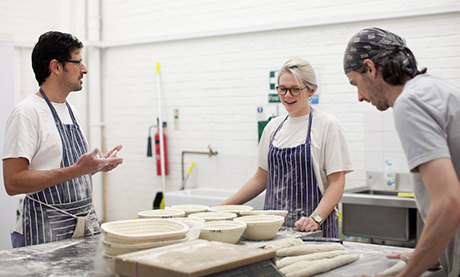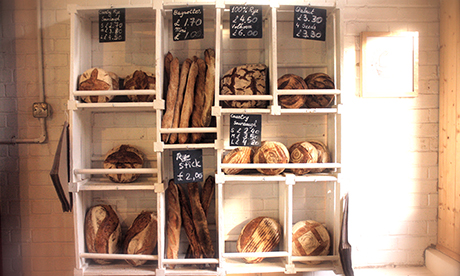Better bread: the Haggerston bakery that nourishes mind and body
Great bread, a big open space and Lady Gaga playing in the background – the Better Health Bakery in Haggerston doesn’t feel like your average mental health organisation, or your average bakery for that matter.
The project, which started in November 2012, has managed to couple making high quality artisan bread with running training courses for people who are recovering from mental ill health.
They work one day a week for three months, first learning how to make the dough, then moving on to working at the till and helping at the bakery’s Stoke Newington Market stall.
The bakery aims to accommodate its trainees while also having genuine deadlines. The set-up is designed to help get trainees back on the path to work.
“Making bread is a very skilful process and can be therapeutic,” says Better Health Bakery project manager Joanna Bojczewska. “It’s like magic happens when kneading and shaping the dough.”
The bakery is committed to producing high quality bread, and it balances this with work to support trainees, which can be quite a challenge, especially if they have had a difficult week.
“The human side of it is central,” says head baker Yann Lamour. “But at end of the day we still have to produce the bread. However, I would rather stay behind and make sure it’s done than not care for our trainees.”
The bakery is one of three projects headed up by the Centre for Better Health, which also offers counselling and runs a ‘community hub’.
The aim of the centre is to promote well-being, support recovery and fight the stigma surrounding mental health.
Director Ashwin Mathews says that even though the centre has existed for years to provide work experience opportunities, a changing landscape for charities and for their funding in particular means they had to find a new way of supporting people.
“We were looking for a new business that would tick a number of boxes,” he says. “Something labour intensive but which takes some time and is ideally therapeutic in some ways, and which could involve training. A bakery was the business that seemed to do all of these things.”
When customers come in for a loaf of their famous organic sourdough bread or a cup of coffee, the bakery itself isn’t tucked away in a corner. The open plan room means they can appreciate the inclusive, friendly atmosphere – just like the trainees.
Mathews says people struggling with mental ill health can become very isolated, either because of their health itself or because they have had to go into an institution.
“The bakery is a chance to work in a business preparing the bread, but more than that it is about all the soft skills – having the chance to chat and be plugged into the local community,” he adds.
On the employability side, the bakery has seen real success resulting for its trainees. Many have moved on to undertake further training and have clinched jobs in local restaurants and cafes. Two former trainees now work for the bakery itself.
“A lot of times people don’t want to go after three months and want to carry on after training,” says Mathews, “but we have an end point right from the beginning, so they make the most out of the placement.
“We are working with individuals to get them to find a successful route outside of the project.”
As well as the trainees the bakery is staffed by volunteers, who are the “real stars” according to Bojczewska, as their support means the baker can focus on the trainees.
“We have volunteers of all ages and all walks of life; people with baking experience, people from mental health or health sectors, people training in counselling or care work, or people who just want to do something good.”


